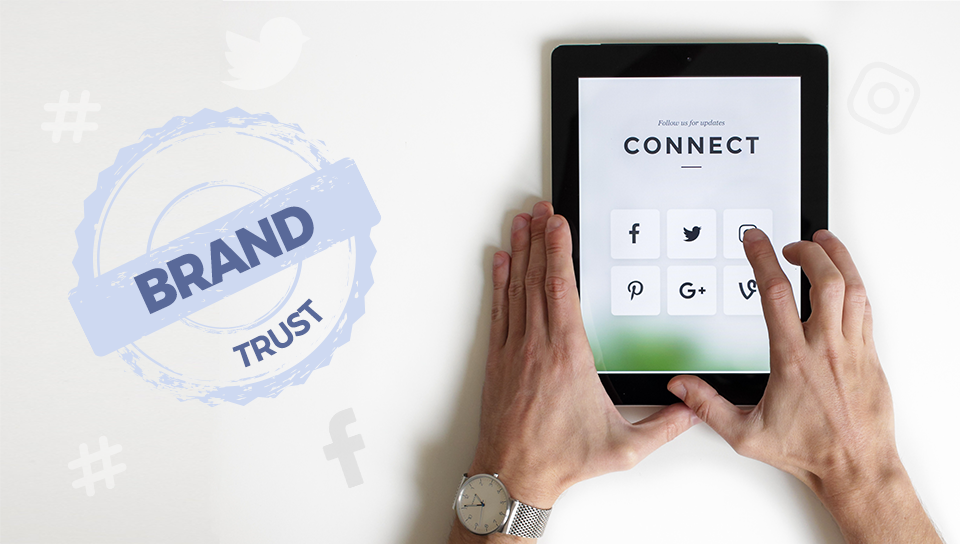Trolls— they give life to our legends and myths—ugly, slow-witted creatures dwelling in caves, mountains, or isolated rocks.
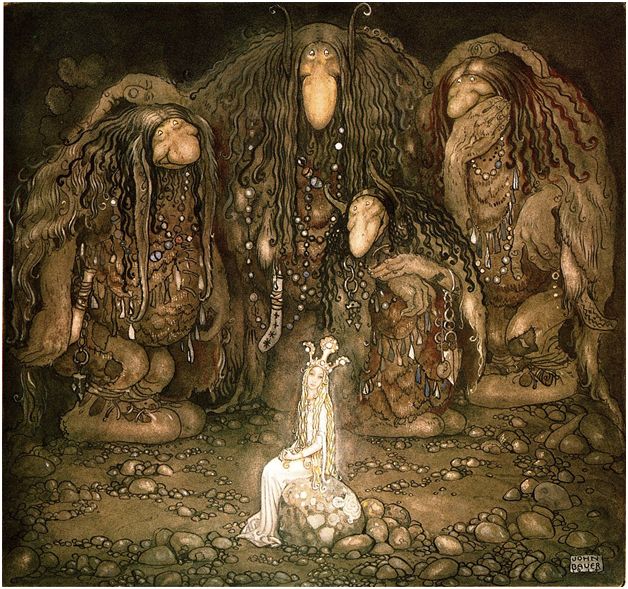
Then, there are the DreamWork’s Trolls. The colorful, cute (not-so ugly) trolls with angelic singing voices.
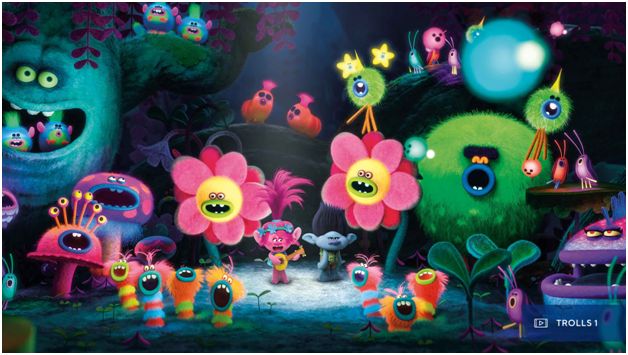
But the worst of them all…
Social media trolls.
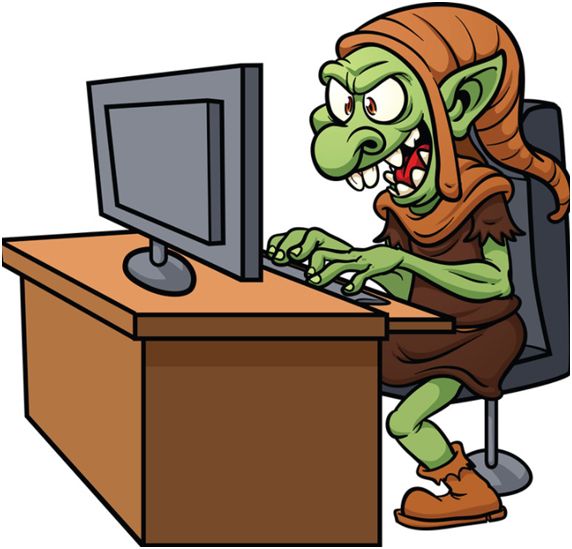
They’re dangerous and they’re very real— existing and scattered in everyone’s favorite social platform to inflict ridicule, pain, and humiliation to their targeted individual.
When left alone, these social media misfits will tarnish your reputation and brand. Thus, you’ll have to deal with them, carefully!
I’ll show you exactly how, but first…
Social Media Trolls: What Exactly Are They?
Social media trolls are people— like you and me—who have a nasty side and love to deliberately provoke others online. They do this by saying offensive and mean things, and they excel most in making people angry, frustrated, and upset.
People like your brand’s followers and fans.
They love ranting, also known as keyboard warriors spewing hate speech and even posting death threats. They attack other’s character, saying things to appeal to the crowd’s feelings (rather than their intellect).
They are annoying foes—in fans’ or followers’ clothing—of your business.
Trolls usually don’t believe what they say but say it anyway with the goal of pissing anyone else.
In simpler terms, social media trolls are online bullies.
So, where do these nasties lurk?
Everywhere. Wherever people share, post, and comment—they’ll be there. Whether it is on your new blog, discussion forums, email groups, chat rooms, and most of all, social media.
Given the time and effort you invested in creating your website, the last thing you want is someone to belittle your output. Who do they think they are to say you’re not credible enough?
Trolls will.
Ugly Troll or an Upset Customer?
Trolls can cause sleepless nights for social media marketers, business owners, and customer service agents.
It’s worse for people who worked hard to build their online business from scratch, spending long hours of research to identify the best online niche, target audience and the best marketing approach to use, only to have online trolls demolish this in one go.
Let’s be clear, trolls are not angry and unhappy customers.
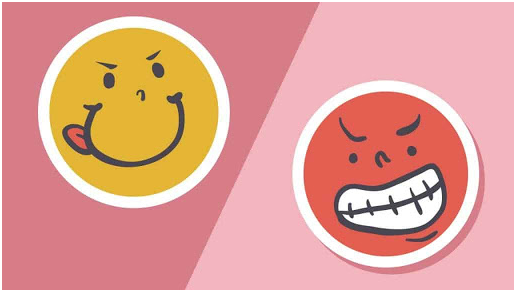
Nowadays, the internet is filled with people expressing their opinions. This includes the upset customers who want to share their negative, but very sincere, beliefs.
So, it is a good idea that you know the difference between a nasty troll with a goal versus an upset customer with a genuine rant. Sure, it can be difficult to say which is which. Both might appear annoyed, perhaps even enraged or furious.
Just take a look at the words they use. Do they appear annoyed or frustrated, expressing a seemingly authentic claim about your small business website, service, or product?
Do they abide by the social media etiquette? Are they searching for the truth? Or do they have misplaced outrage, trying to incite anger in your brand, or directing insult to another user?
Furthermore, an unhappy customer will want to be heard. When you do and address their issue, they will be satisfied. The negative messages will then cease to exist.
Not with online trolls, though. They will not stop until they get bored or banned. They are not looking for a resolution, all they want is to engage in a battle of nonsensical words.
5 Signs You’re Dealing with a Troll
If you’re still confused, let’s dig deeper on how you can determine if it’s a troll you’re dealing with.
1. Feeling Entitled
Most trolls will have this non-existing sense of worthiness (but won’t be able to lift Thor’s Mjolnir). They like to think that they are the center of the world.
They’re like:
“Me, I, myself… amazing, great, awesome. You, all of you? Suck. Boo!” Or something along these lines.
If you see something like that, you’re looking at detestable trolls.
2. “I Want You Angry”
Social media trolls exist for the very purpose of upsetting and frustrating people.
They’re like: “I want you angry, so I can be angrier.”

Got a user on Facebook or Instagram stirring up trouble, posting upsetting content, or starting nonsensical arguments? If they appear rude and insincere in their posts, statements, or comments? That’s a troll right there!
3. Make It Personal
Arguments, debates, and discussions—all these are safe and healthy talks amongst internet users.
When it becomes personal, then it becomes a different matter.
This is what trolls do.
Instead of discussing matters, logically and reasonably (possibly with a hint of frustrations, but still healthily argumentative), trolls like to attack others’ character. They will call people names, stating things that appeal to prejudice and feelings, instead of intellect.
4. Exaggeration Is Their Middle Name
Social media trolls exaggerate. Like a lot! They like to use strong words like “everything”, “all” “never ever”, whereas most will just say “some” or “occasionally”.
Trolls use superlatives and extremes as a way to inflame, insult, and frustrate other users.
5. Spelling Fluke
Much like the mythical trolls in legends and folklore who can’t cast spells, social media trolls seem to suck at spell-ing.
Social media trolls, perhaps because they’re so busy firing up their keyboard seem to:
- Use words wrong
- Spell words wrong
- Mixing up words that sound the same, but actually meant something
- Avoiding periods and commas
- Don’t capitalize the first words, but capitalize all words
- Using goofy and made-up words
- Say “I” or “me” a lot, same for the “!!!!!!!” marks
According to Stanford and Cornell researchers on their study about online anti-social behaviors, internet trolls fail the standard readability metrics for the things they write. They like to use the less positive words with much profanity.
Fortunately, that makes it WAAAAAY EZIER for you to spot deez freaking SOCIOpaths!!!
So, as you can see, social media trolls give themselves away easily.
So, now that you have confidently identified which is which, how do you handle these horrible creatures?
Tips to Handling and Defeating Trolls on Social Media
1. Write a Troll-Protection Policy
Social platforms will have their own community policies for being respectful and avoid unnecessary fights and arguments.
So, create one for your brand page too!
Take a look at this example:
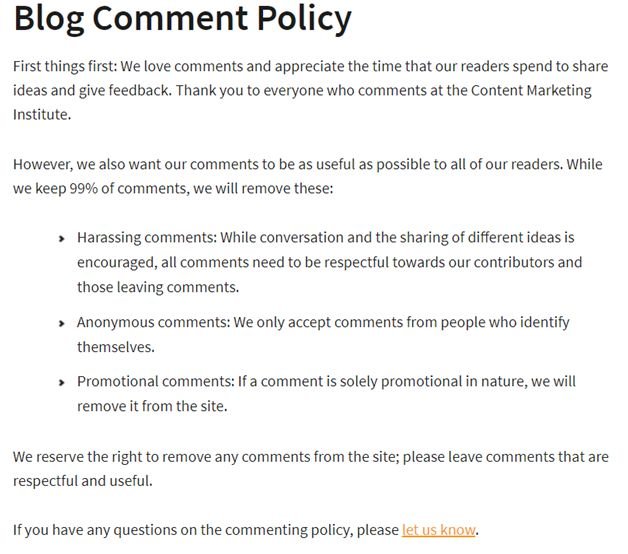
Your established policy will act as a reminder of the acceptable behaviors for comments, posts, and shares.
Now, if someone acts tough, breaking your policy, use your policy to kick them out. Because the rules have been established, breaking them is grounds for banishment.
Politely say something like:
“Hi there user freakinggorgeous666, I’m nudging you with a friendly reminder about our community policy here.”
There’s no need for them to take it personally when it is written out. Unless they don’t care, right?
2. Ignore ‘Em
Trolls want attention. So, the best way to deal with them is to make it look like their comments or posts are worthless. When they light up your comment section with profanity, the best way to quickly put out their fire is to ignore them.
Don’t waste your time responding and arguing with a troll—it is exactly what they want. They want to upset you, don’t give them that pleasure. Deprive them of their life force, so that they will go dig and annoy elsewhere.
The best thing you can do is to quietly delete the comments and move on.
However, while you as the admin choose to ignore their nonsense, some well-meaning members might not. With that, the troll gains the traction that it craves for.
This means that inactivity is no longer your option.
No worries, there are other ways to avoid tragedy.
3. Troll The Troll With Humor
An effective way to tackle social media troll is to troll them back, but with some humor, possibly sprinkled with sarcasm and wit.
Let’s take a look at an example:
Here, UK SMS system company O2 responded with a humorous and witty recommendation to an unbelievable troll.
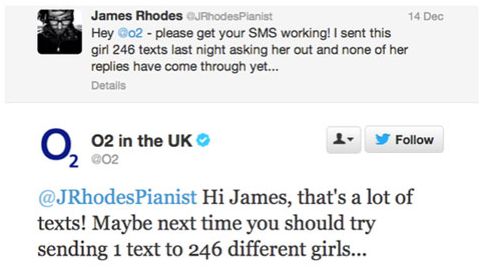
When you make light of a troll’s post, you can simultaneously acknowledge and then defuse the whole situation.
Here’s another great example from Netflix clapping back at the homophobic comment on the new Netflix docuseries about a drag queen entitled Dancing Queen.
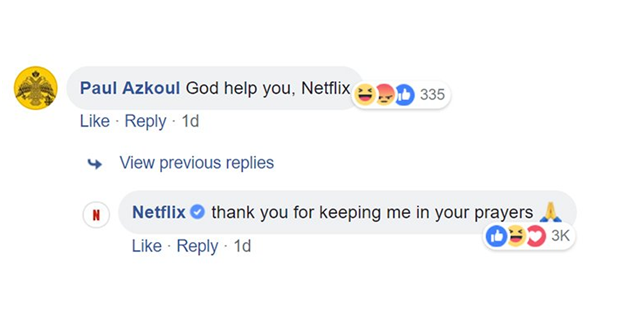
Take note, however, that this strategy can potentially backfire if your response is not witty enough and you sound just like another troll.
But, if you’re “savage” enough, responding to trolls with humor and roasting comments, it is likely that you can earn a lot of brownie points and boost social engagement.
Take a look at this example from Wendy’s:
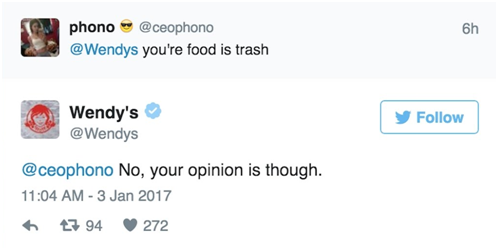
For proper roasting, you need to take care not to personally attack anyone or get too much drawn into an argument. It’s still about rising above whatever arguments that the troll is trying to start.
Libel and defamation absolutely still apply, so make sure not to personally attack someone, even if it’s a troll. Don’t accuse them of doing anything illegal either.
4.Respond with Facts
If you find yourself engaging in a conversation that includes a troll, you should be intentional on how you respond and always answer with facts.
Above all, always stay classy.
Avoid emotionally defensive or charged messages that can encourage further trolling behaviors. Limit yourself to respond solely with facts. Answer questions with facts about your service or product and any customer service policies and guarantees that your brand offers.
Responding professionally and promptly shows that you’re aware of the problem and are addressing it accordingly. In most cases, this can already disarm a troll and disprove its claim. In addition, providing transparency about how you handle problems can go a long way in retaining your loyal customers and keeping trolls at bay.
Here’s a good example in action:
A problem occurred at Jeffree Star Cosmetics regarding quality control with their new eye shadow product. Instead of denying or ignoring the issue, Jeffree Star went to social media and admitted that a few dozen customers received defective palettes.
He then said that all affected consumers will receive new palettes and a full refund.
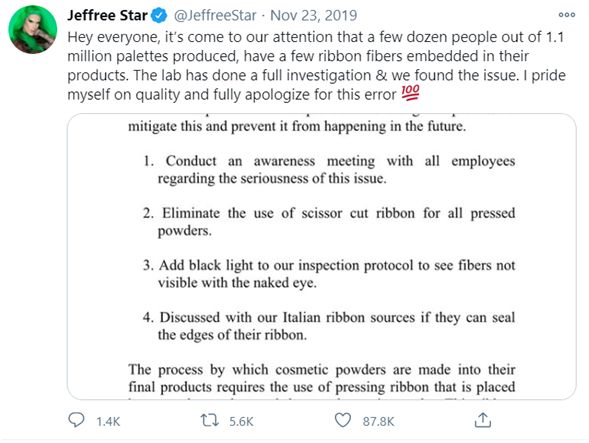
But it doesn’t stop there. After apologizing, Jeffree Star shared a video showing the exact steps that his company takes in their quality control in order to reduce the chances of a similar situation.
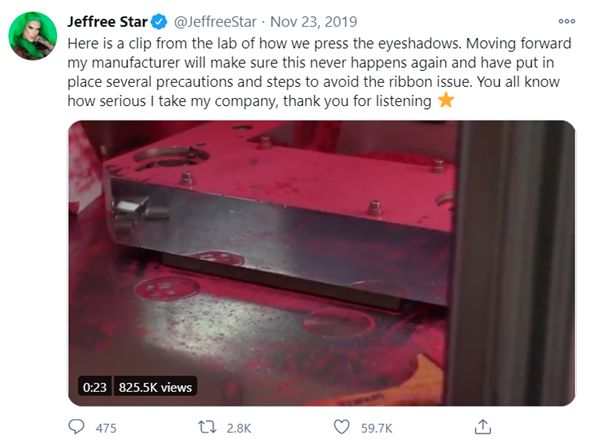
The responses to these announcements were very positive, with their community very much impressed by the professionalism demonstrated in the situation.
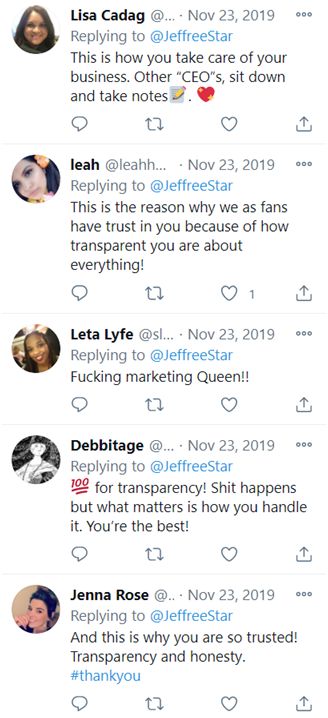
5. Never Ignore Abuse Directed to Your Followers
Most of the time, it is recommended to ignore trolls. However, you shouldn’t overlook when they directly abuse one of your followers.
An example of such abuse unfolded on Facebook. H&M Sweden failed to take action against abusive trolls, threatening a female customer for writing a feminist post on the company’s website.
The company’s social media team ignored the threatening comments for more than a month, even though they already promised to remove them. Both H&M brand and Facebook were condemned for not taking action.
A troll decided to target the guest of BBC Radio with defamatory language. Jeremy Vine replied with this:
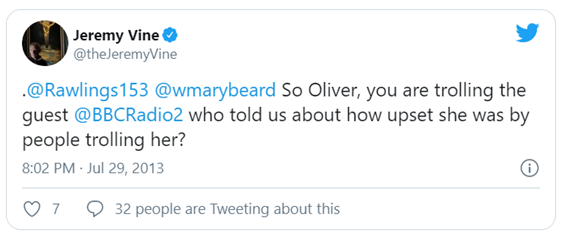
And soon after, people started to pile against him.



A brand should step in if they see any situations of a follower or customer being trolled on their social media, especially those leaving abusive and threatening comments. Any abuse against another follower should be acknowledged and dealt with immediately.
In the instance that a user singled out and targeted others in a derogatory and personal manner, then the brand should always issue a comment that such behaviors won’t be tolerated and will be deleted. If trolls still won’t stop, the social media admin should ban or block the said user.
Final Thoughts
You worked hard to make one of the best small business ideas become big and within the radar of trolls. While it’s bad that they notice you, it also means they feel threatened with your success. When troll troubles come in, remember that there are professional and elegant ways to defeat them.
Never stoop to their level.
Take the high road. Ignore ‘em, use humor, kindness, and facts to shut ‘em up, or completely ban or block ‘em! This way, you can make your community a fun and safe place and perhaps make the internet a better place.
.png)

